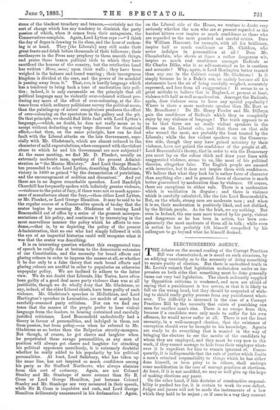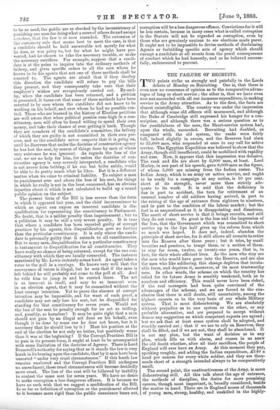ELECTIONEERING AGENCY.
THE debate on the second reading of the Corrupt Practices Bill was characterised, as is usual on such occasions, by an edifying unanimity as to the necessity of doing something to secure purity of election. But there is undoubted truth in Mr. Lewis's remark that legislation undertaken under an impression on both sides that something must be done generally turns out very bad legislation. The check ordinarily supplied by Opposition criticism is weakened, and men are afraid of saying that a punishment is too severe, or that it is likely to fall on the wrong head, lest they should be suspected of wishing to shield really guilty persons from any punishment whatever. The difficulty is increased in the case of a Corrupt Practices Bill by the necessity that exists of punishing one man for another man's sins. There is no escaps from this, because if a candidate were only made to suffer for his own offences, he would never suffer at all. There is not the least necessity, in a well-managed election, that the existence of corruption should ever be brought to his knowledge. Agents are ready to. do everything that is wanted in the • way of bringing the electors to see the merits of the candidate by whom they are employed, and they must be very new to the work, if they cannot manage to hide from their employer whatever it is expedient for him to remain ignorant of. Consequently, it is indispensable that the rule of justice which limits a man's criminal responsibility to things which he has either done himself, or been privy to in others, shall undergo some modification in the case of corrupt practices at elections. At least, if it is not modified, we may as well give up the hope of making elections any purer.
On the other hand, if this doctrine of constructive responsibility is pushed too far, it is certain to work its own defeat. Judges and jurors will not be made the instruments of a law which they hold to be unjust ; or if once in a way they consent to be so used, the public are so shocked by the inconsistency of punishing one man for doing what a score of others do and escape scot-free, that the law is at once amended. The extension of the customary rule that seems best to meet the case, is that a candidate should be held answerable not merely for what ho does, or was privy to, but for what he might have pre vented, had he chosen to take the necessary trouble, or make the necessary sacrifices. For example, suppose that a candi date is at the pains to inquire into the ordinary methods of bribery, and gives specific orders to all the men whom he knows to be his agents that not one of these methods shall be resorted to. The agents are afraid that if they disobey this direction the candidate will refuse to pay the bills they present, and they consequently take care that their employer's wishes are scrupulously carried out. By-and
by, when the candidate has been returned, and a petition is presented, it turns out that some of these methods have been resorted to by men whom the candidate did not know to be working on his behalf, and over whom he had no possible control. Those who are learned in the history of Election petitions are well aware that when political passion runs high in a constituency, men will often be found willing to spend their own money, and take their chance of ever getting it back. Though they are members of the candidate's committee, the bribery of which they are guilty is not committed in their own persons, and so the candidate never suspects that it is going on, until he discovers that under the doctrine of constructive agency he has lost the seat, by reason of things done by men of whose -very existence he was ignorant. As regards the loss of the seat, we see no help for him, for unless the doctrine of constructive agency is very severely interpreted, a candidate who is not averse from bribing, if he can but bribe safely, would be able to do pretty much what he likes. But it is a different matter when we come to criminal liability. To subject a man to punishment over and above the loss of his seat, for things in which he really is not in the least concerned, has an obvious injustice about it which is not calculated to build up a sound public opinion on the subject.
The present form of the Bill is less severe than the form in which it appeared last year, and the chief inconvenience to which an agent can expose an innocent candidate is disqualification for representing the constituency in Parliament. No doubt, that is a milder penalty than imprisonment ; but to a politician it may be still a very severe penalty. It is true that where a candidate has been reported guilty of corrupt practices by his agents, this disqualification goes no further than the particular constituency. It is only where the candidate is personally guilty that it extends to all constituencies. But to many men, disqualification for a particular constituency is tantamount to disqualification for all constituencies. They have really no chance of being returned, except for the one constituency with which they are locally connected. The instance mentioned by Mr. Lewis certainly seems hard. An agent takes a voter to the poll in a carriage. He knows very well that the conveyance of voters is illegal, but he sees that if the man is left behind he will probably not come to the poll at all. And he tells him to jump in and be carried there. The act is so innocent in itself, and may be so innocent even in an election agent, that it may be committed without the least corrupt intention. Yet to prove the absence of corrupt intention may be impossible, and for want of such proof, a candidate may not only lose his seat, but be disqualified for standing for that constituency for seven years. Would not the loss of the seat be penalty enough for an act so trifling, and, possibly, so harmless ? It may be quite right that a man should not gain by an illegal act done on his behalf, even though it be done by some one he does not know, but is it necessary that he should lose by it ? Must his position at the end of the election be not only no better, but positively worse than it was at the beginning? If the Corrupt Practices Bill is to pass in its present form, it ought at least to be accompanied with some limitation of the doctrine of Agency. There is Lord Bramwell's authority for saying that as it stands the law is very harsh in its bearing upon the candidate, that by it men have been unseated "under very cruel circumstances." If this harsh law remains unaltered and the Corrupt Practices Bill undergoes no amendment, these cruel circumstances will become decidedly more cruel. The loss of the seat will be followed by inability to contest the same seat for seven years. We have no desire to make corruption a less dangerous offence. It is because we have no such wish that we suggest a modification of the Bill. In so far as definition of corruption or the punishment allotted to it becomes more rigid than the public conscience bears oat, corruption will be a less dangerous offence. Convictions for it will be less certain, because in many cases what is called corruption in the Statute will not be regarded as corruption, even by those who are genuinely anxious to see elections made purer. It ought not to be impossible to devise methods of disclaiming
• Agents or forbidding specific acts of agency which should exempt a candidate at all events from the penal consequences of conduct which he had honestly, and as he believed successfully, endeavoured to prevent.



































 Previous page
Previous page